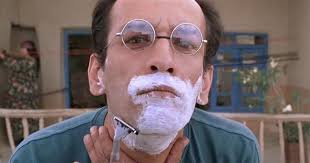Konangal pays tribute
to the great Iranian master
THE WIND WILL CARRY
US
A film by Abbas
Kiarostami
1999 /Iran / 113
minutes
"We're heading nowhere," a disembodied voice
complains as a battered jeep crawls up a winding road through harsh, scrubby
terrain. So begins The Wind Will Carry Us—one of the great films by Iranian
master Abbas Kiarostami.
A busy video producer/engineer Behzad from Tehran is sent to
a remote Iranian village to capture an obscure burial ceremony. But the
'subject' of his film , Mrs. Malek is ill, not dead, forcing the man and his
production crew to slow down, linger in the village, and mingle with the local
families. Along the way, the engineer encounters a radically different
lifestyle than his own, with different priorities. In doing so, his perspective
on the natural world is changed.
Behzad recites a poem in the film , a poem by Furugh
Farrukhzad (1935-67), one of the most extraordinary Persian or Iranian female
poets of the twentieth century, which gives the film its title and which treats
the central conflict in the film, “life in the face of death.” In Iran, people
at all social levels know poetry and quote it to each other constantly, for all
sorts of reasons Poetry and Sufism. Both are useful coordinates for anyone
trying to get a fix on the intent behind this gorgeous, semi-opaque film, The
Wind Will Carry Us
This film is remarkable in its sustained pace, perspective,
and ability to focus so sharply on a single character without revealing too
much of that character, allowing him to retain a sense of mystery and
delightful ambiguity. In the title sequence of The Wind Will Carry Us absences
define presences in numerous ways. In fact, many major characters in the film
-- including Mrs. Malek, Youssef, and all three members of Behzad's crew -- are
never seen. Most of the sequence unfolds in semidarkness.
The Wind Will Carry Us offers an intricately constructed
spatial world that's as breathtakingly beautiful, as various, and as cosmically
evocative as a Brueghel landscape -- a world teeming with diverse kinds of life
and activity -- and it teases us whenever we want to get to know this world
better, seducing and evading us at the same time. If you're open to the
possibility that the world is bigger than you typically give it credit for, and
you're willing to invest some effort in letting go of your usual way of seeing,
this film will be a revelation for you. (From Internet)
Abbas Kiarostami
June 22, 1940 - July
4, 2016
Abbas Kiarostami, the Iranian filmmaker who is widely
considered one of the world's greatest living directors has written and
directed some 41 movies since the early 1970s, and has been compared by critics
to such titans of international cinema as Ingmar Bergman and Akira Kurosawa.
In her survey of recent achievements in film, Susan Sontag
declared, “Iranian cinema has been the great revelation of the last decade.”
Surely one of those largely responsible for this phenomenon is the screenwriter
and director Abbas Kiarostami. Few new films draw comparisons to classics like
Mr. Bergman's "Wild Strawberries," Michelangelo Antonioni's "Red
Desert" or Jean-Luc Godard's "Contempt." Mr. Kiarostami's movies
not only evoke such parallels; they also seem to infuse the beleaguered
art-film traditions with fresh urgency.
Born in Tehran in 1940, Kiarostami worked as a commercial
artist and children’s book illustrator until he was invited to lead the
department of cinema at the Institute for the Intellectual Development of
Children and Young Adults. Given this background, it’s not surprising that many
of his projects feature children. Kiarostami is a graduate of Tehran
University’s Faculty of Fine Arts in Painting
Mr. Kiarostami's own filmmaking began at the end of the
1960's when the loose-knit movement later labeled the Iranian New Wave was just
gaining steam. One hallmark of Mr. Kiarostami's work is its esthetic
consistency. "Bread and Alley," the first short he made, in 1970, has
qualities that distinguish his films up to "Taste of Cherry": a
lyrical but concrete feel for the particulars of place and visual atmosphere; a
way of eliciting strikingly natural performances from nonactors; and stories in
which an anecdotal surface disguises a rich substratum of philosophical,
allegorical or social concerns.
Mr. Kiarostami did not consider leaving the country during
the Iranian revolution of 1978-79, he said, "because of a revolution going
on in my own house." His own marriage was failing. Pierre Rissient, an
executive with Ciby 2000, the French company that handles worldwide sales of
"Taste of Cherry," says that Mr. Kiarostami "proceeds the way
the Greek philosophers like Heraclitus do, or Chinese figures like Laotzu, or
Japanese Zen poets like Basho -- the poetry is completely linked with
philosophy."
The protagonists of his films are the ordinary people who
surround us. Their lives represent no more and no less of what constitute ours.
Their presence in films provides us with an opportunity to think about the everydayness
of our existence and relationships; an opportunity to see them as a mirror that
reflects the depth of our human feelings and thoughts.
Abbas Kiarostami's films seek to uncover the deepest human
emotions in the most ordinary events in life. His works are a demonstration of
the significance and relevance of these emotions to the restless, captive, and
tormented individuals of the twentieth century.
Everything in Kiarostami's films speaks to the matter at
hand. His films direct the spectator toward central human problems. He has
deeply-held ideas and feelings. He wants to say certain things about life. So
he doesn't waste his time or ours. Nothing has been done merely for effect, to
impress the spectator, to enhance the director's reputation. There aren't so
many artists like that around, unfortunately.
Kiarastomi passed away in Paris on 4th July thus
year. He was later buried in a private ceremony in northern Tehran. Thousands
of Iranians bid tearful farewell to their country’s greatest filmmaker.








